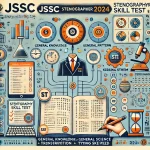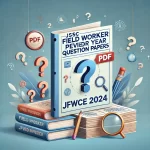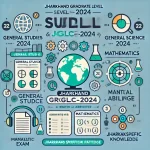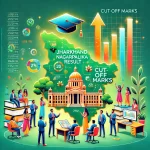Jharkhand Staff Selection Commission (JSSC) conducts the Jharkhand Police Constable Competitive Examination (JCCE) to recruit candidates for constable posts in the state police department.
Aspiring candidates must thoroughly understand the syllabus and exam pattern to excel in the examination. This article provides an in-depth look at the Jharkhand Police Constable Syllabus 2024 and the JCCE-2023 Exam Pattern.
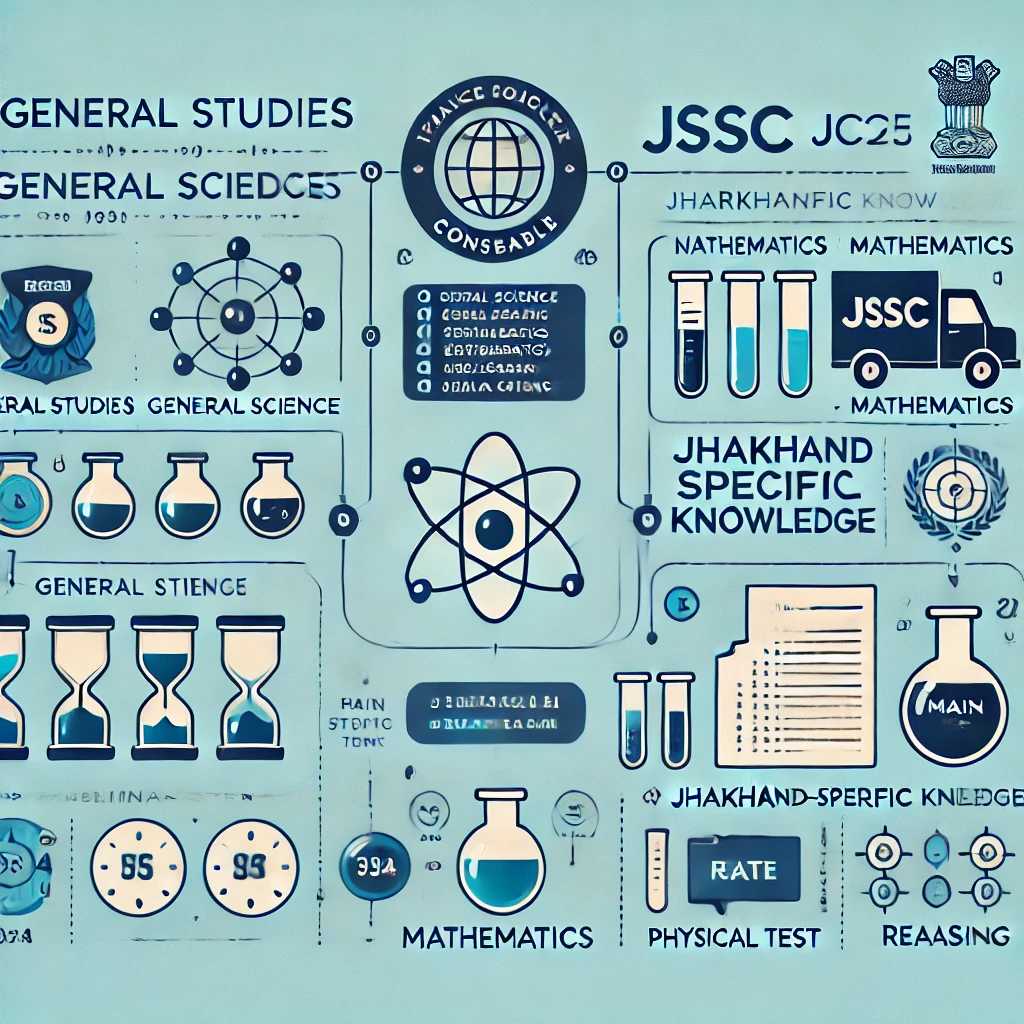
Jharkhand Police Constable Syllabus 2024
The syllabus for the Jharkhand Police Constable examination is broadly categorized into three main sections: General Knowledge, General Studies, and Knowledge Specific to Jharkhand. Below is a detailed breakdown of the syllabus for each section.
- Must See: Jharkhand Matric 10th Level Syllabus 2024 JMLCCE JSSC Exam Pattern
- Must See: Jharkhand Inter 12th Level Clerk Syllabus 2024 JSSC JIS CKHT CCE-2023 Exam
- Must See: Jharkhand Excise Constable Syllabus 2024 JECCE JSSC Exam Pattern
- Also See: JSSC Field Worker Previous Year Question Papers JFWCE 2024 (PDF Download)
- Jharkhand’s Government Jobs: https://4syllabus.in/tag/jharkhand/
- Latest JSSC Notifications & Updates: https://4syllabus.in/tag/jssc/
- JSSC Official Website: https://jssc.nic.in/
Contents
- 1 Paper 1: Regional/Local/Tribal Language Syllabus
- 2 Paper 2 (Part A: Hindi Language) Syllabus (50 Questions)
- 3 Paper 2 (Part B: General Knowledge & Numerical Ability) Syllabus (50 Questions)
- 4 a) General Knowledge Syllabus (25 Questions):-
- 5 b) Numerical Ability Syllabus (25 Questions):-
- 6 JSSC JCCE-2023 Exam Pattern
- 7 Main Written Examination Pattern
- 8 Jharkhand Constable Important Preparation Tips
- 9 Final Words On JSSC JCCE-2023-2024 Exam
- 10 Important FAQs
Paper 1: Regional/Local/Tribal Language Syllabus
हिन्दी / अंग्रेजी / संस्कृत/ उर्दू / संथाली / बंगला / मुण्डारी (मुण्डा)/ हो / खड़िया / कुडूख(उरांव)/ कुरमाली / खोरठा / नागपुरी / पंचपरगनिया / उड़िया / में से किसी एक भाषा की परीक्षा विकल्प के आधार पर अभ्यर्थी दे सकेंगे। इस परीक्षा में संबंधित भाषा के 100 बहुवैकल्पिक प्रश्न पूछे जायेंगे । क्षेत्रीय भाषा के लिए पाठ्यक्रम आधिकारिक अधिसूचना में विस्तार से दिया गया है।
विषय : हिन्दी
पुस्तक क्षितिज भाग-2
काव्य – खण्ड
- उधो तुम हौ अति बड़ेभागी – सूरदास
- राम-लक्ष्मण-परशुराम संवाद – तुलसीदास
- ‘डार द्रुम पलना’ ‘पलनी नुपूर ‘ – देव
- ‘आत्मकावय’ – जयशंकर प्रसाद
- ‘उत्साह’, ‘अट नहीं रही – सूर्यकान्त त्रिपाठी निराला
- ‘फसल’, ‘यह दंतुरित मुस्कान’ – नागार्जुन
- छाया मत छुना मन – गिरिजा कुमार माथुर
- कन्यादान – ऋतुराज
- संगतकार – मंगलोश डबराल
गद्य-खण्ड
- नेता जी का चश्मा – स्वयं प्रकाश
- बाल गोबिन भगत – रामवृक्ष बेनीपुरी
- लखनवी अंदाज – यशपाल
- मानवीय करूण की दिव्य चमक – सर्वेश्वर दयाल सक्सेना
- एक कहानी यह भी – मन्नू भंण्डारी
- स्त्री शिक्षा के विरोधी, कुतर्कों का खण्डन – महावीर प्रसाद द्विवेदी
- नौबत खाने में इबादत – यतीन्द्र मिश्र
- संस्कृति – भक्त आनन्द कौसल्यान
पुस्तक – कृतिका भाग-2
- माता का आँचल – शिवपूजन सहाय
- जार्ज पंचम की नाक – कमलेश्वर
- साना साना हाथ जोडि – मधु कांकरिया
- एही ठैयाँ झुलनी हेरानी हो रामा – शिवप्रसाद मिश्र रूद्र
- मैं क्यों लिखता हूँ – अज्ञेय
व्याकरण:- क्रिया भेद, वाक्य भेद, संज्ञा, सर्वनाम, अव्यय, क्रिया विशेषण, अविकारी, समास, कारक, अनेकार्थी शब्द, मुहावरे, विपरीतार्थक शब्द, पत्र लेखन।
Subject:- English Language and Literature
1. Language
- Error Recognition.
- Grammar:- Adjective, Noun, Pronoun, Verb, Subject-Verb, Agreement, Interchangeability of Noun and Verb, Gerund, Participle, Infinitive, Adverb, Tense, Clause, Transformation, Narration, Voice, Preposition.
- Synonyms.
- Antonyms.
- Idioms & Phrases, Comprehension Passage etc.
2. Literature
- Novel:- Oliver Twist- Charles Dickens; Animal farm- George Orwell; Five Point Someone- Chetan Bhagat; Treasure Island- R.L. Stevenson; Retold Stories: Lamb’s Tales from Shakespeare
- Poetry:- The Daffodils- William Wordsworth; The Donkey- Sir J. Arthur Thomson; Death Be Not Proud- John Donne; Leisure- W.H. Davis; Where The Mind Is Without Fear- Rabindranath Tagore; The Loveleist of Tress, The Cherry Now- A.E. Housman
- Short Stories:- Three Questions- Leo Tolstoy; The Tiger’s Claw- R.K. Narayan; A Man Who Had No Eyes- Mackinley Kantor; The Lost Jewel- Rabindranath Tagore .
- Essay:- Good Manners- J.C. Hill; The Sun, the Planets and the Stars- C. Jones; Animals In Prison- Jawaharlal Nehru; Forgetting- R. Lynd.
- History of the English Language (in short):- A History of English Language- A.C. Baugh,
- Origins of the English Language:- Joseph Willies, Wikipedia.org
Note: Please check official notification of JCCE-2023 for other regional/tribal language syllabus.
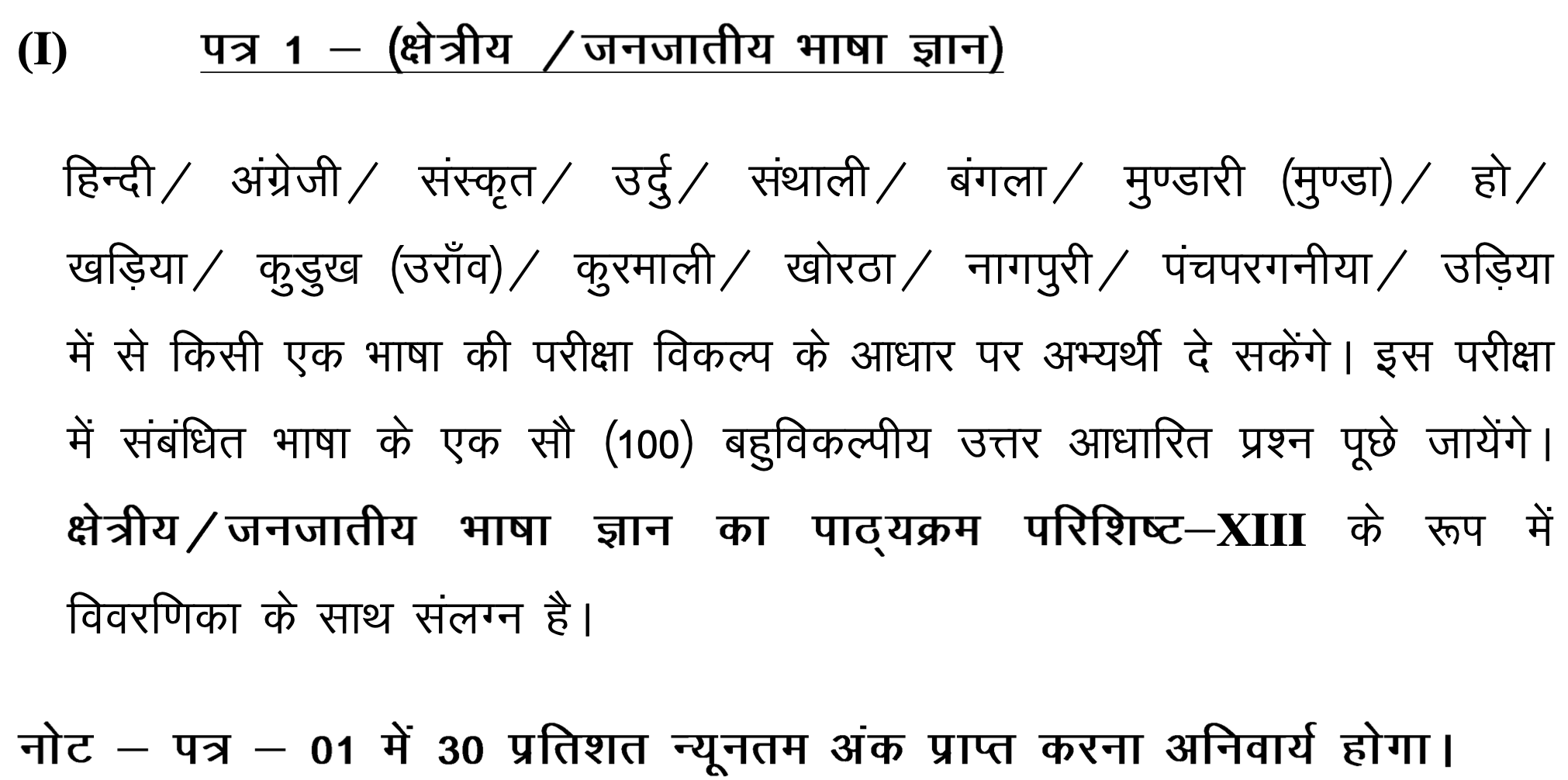
Paper 2 (Part A: Hindi Language) Syllabus (50 Questions)


- Hindi Syllabus:-
- स्वर एवं व्यंजन
- स्वर और व्यंजन वर्णों का वर्गीकरण,
- संज्ञा,
- सर्वनाम,
- विचार,
- तत्सम,
- तद्भव,
- प्रत्यय,
- उपसर्ग,
- समास,
- संधि,
- पर्यायवाची,
- विलोम,
- वाक्यांश के लिए एक शब्द,
- मुहावरे एवं लोकोक्ति,
- विराम चिन्ह,
- वाक्य शुद्धि,
- अनुच्छेद आधारित प्रश्न उत्तर
Paper 2 (Part B: General Knowledge & Numerical Ability) Syllabus (50 Questions)
This section tests the candidate’s awareness of current events, national and international affairs, and historical, geographical, political, and economic knowledge. The key areas covered are:
a) General Knowledge Syllabus (25 Questions):-
- Indian History: Ancient, Medieval, and Modern History of India, focusing on major events, movements, and personalities.
- Geography: Physical, Social, and Economic Geography of India, including landforms, climate, and vegetation.
- Indian Polity: Constitution of India, Political System, Governance, and Public Policy.
- Economy: Basic concepts of economics, Indian economy post-independence, budget, and economic planning.
- Current Affairs: National and international current events, including government schemes, sports, and important days.
- Physics: Basic principles of mechanics, electricity, magnetism, optics, heat, and thermodynamics.
- Chemistry: Fundamentals of chemical reactions, atomic structure, acids, bases, salts, and everyday chemicals.
- Biology: Plant and animal biology, human anatomy, diseases, and their prevention.
- History of Jharkhand: Tribal movements, freedom struggles, important personalities.
- Geography of Jharkhand: Physical features, rivers, mineral wealth, climate, agriculture.
- Culture of Jharkhand: Folk dances, music, festivals, customs, and traditions of the tribal communities.
- Economy of Jharkhand: Industry, agriculture, forestry, and mining in the state.
b) Numerical Ability Syllabus (25 Questions):-
This section tests the candidate’s numerical ability and mathematical skills:
- Arithmetic: Percentages, ratio and proportion, time and work, profit and loss, and averages.
- Algebra: Simple equations, quadratic equations, and algebraic identities.
- Geometry: Lines and angles, triangles, circles, and area calculation.
- Statistics: Basics of data interpretation, mean, median, and mode.
JSSC JCCE-2023 Exam Pattern
The Jharkhand Police Constable Exam Pattern includes multiple stages to assess the candidates’ overall capabilities. Each stage is crucial for progressing to the next phase. Below is a detailed overview of the exam pattern:
Main Written Examination Pattern
Candidates who qualify for the Prelims proceed to the Main Examination, which is divided into multiple papers focusing on different subjects.
- Paper I: Regional / Local / Tribal Language
- Total Number of Questions: 100 questions.
- Total Marks: 300 marks.
- Time Duration: 2 hours.
- Negative Marking: 1 mark
- Minimum Qualifying Marks: 30% (90 marks out of 300 marks)
- Paper II: Part 1 Hindi
- Total Number of Questions: 50 questions.
- Total Marks: 360 marks.
- Time Duration: 2 hours.
- Negative Marking: 1 mark
- Paper II: Part 2 General Knowledge and Numerical Ability
- Total Number of Questions: 50 questions.
- General Knowledge: 25 Questions
- Numerical Ability: 25 Questions
- Total Marks: 300 marks.
Jharkhand Constable Important Preparation Tips
- Understand the Syllabus: Make sure to have a comprehensive understanding of each section of the syllabus. Focus on state-specific knowledge about Jharkhand, as it forms an integral part of the exam.
- Time Management: Practice solving papers within the stipulated time to improve speed and accuracy. Work on subjects that you find challenging.
- Mock Tests & Previous Papers: Solve mock tests and previous year’s papers regularly to familiarize yourself with the exam pattern and to identify areas that need improvement.
- Focus on Physical Fitness: Since the Physical Efficiency Test is a key part of the selection process, ensure regular fitness training. This will help you meet the required physical standards.
- Stay Updated: Keep yourself updated on current affairs, especially related to Jharkhand, and study government publications, newspapers, and current affairs magazines.
Final Words On JSSC JCCE-2023-2024 Exam
The Jharkhand Police Constable Syllabus 2024 and the JSSC JCCE-2023 Exam Pattern are designed to assess the candidates’ academic knowledge, logical reasoning, and physical fitness comprehensively.
With diligent preparation and a clear understanding of the syllabus and exam structure, candidates can perform well in the examination and secure a position in the Jharkhand Police Force.
Important FAQs
How many papers are there in the JSSC JCCE Main Examination?
The Main Exam typically consists of multiple papers, usually covering:
- Paper I: Local / Regional Language.
- Paper II: Hindi, General Knowledge and Mathematics.
What subjects are covered in the JSSC JCCE syllabus?
- General Hindi
- General Studies: History, Geography, Polity, Economy, Current Affairs.
- General Science: Basic concepts of Physics, Chemistry, Biology.
- Mathematics: Arithmetic, Algebra, Geometry, Statistics.
- Jharkhand-Specific Knowledge: History, culture, geography, and economy of Jharkhand.
What is the time duration for each exam paper?
Each paper has a time duration of 2 hours.
Is there negative marking in JSSC JCCE exams?
Yes, there is a negative marking of 1 mark for each wrong answer. Right answer 3 marks.
What are the qualifying criteria for the JSSC JCCE exam?
30% marks in Paper 1 only.
How can I prepare for the Jharkhand-Specific Knowledge section?
Focus on Jharkhand's history, culture, and geography. Study from state-specific books and government publications to enhance knowledge about the region.


